
The Francis B. Austin House is a historic house at 58 High Street in the Charlestown neighborhood of Boston, Massachusetts. Built about 1832 and restyled in the 1860s, it is a good local example of Second Empire architecture. The Austins, for whom it was built, were prominent local landowners and businessmen. The house, converted into multiunit housing in the 20th century, was listed on the National Register of Historic Places in 1988.

St. Mary's Complex is a historic Roman Catholic Church complex at Broadway and Washington Street in Taunton, Massachusetts. The parish, the first in Taunton, was established in 1830, and the present church, its second was built in 1868, to a design by Patrick C. Keely. The complex, also including a rectory, convent, and school, was listed on the National Register of Historic Places in 1984.

The Albert Sweet House is a historic house located at 179 Highland Street in Taunton, Massachusetts.
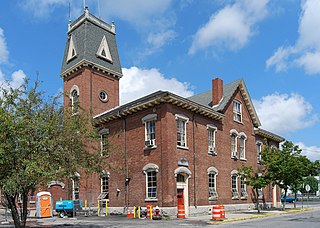
The Central Fire Station is an historic fire station at Leonard and School Streets in Taunton, Massachusetts. Built in 1869, it is the third oldest fire station still in use in the country, and the oldest in the city. It is the oldest *continuously operated* fire station in the country, never having closed for any period of time. It houses Taunton's Engine 1, Ladder 2, Ladder 3 and the Deputy Chief. It was listed on the National Register of Historic Places in 1984.

The William L. White Jr. House is a historic house located at 242 Winthrop Street in Taunton, Massachusetts.
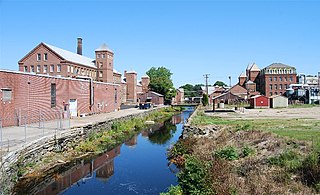
The Reed and Barton Complex is a historic industrial complex at West Brittania and Danforth Streets in Taunton, Massachusetts. It is the site of one of Taunton's first and largest industries, now known as Reed & Barton, a privately held silversmithing business that operated from 1824 to 2015. The company's success was instrumental in Taunton becoming known as the "Silver City". The complex was listed on the National Register of Historic Places in 1984.

The Washington School is a historic school building at 40 Vernon Street in Taunton, Massachusetts. The two story brick building was designed Gustavus L. Smith, and built in 1897 during a period of burgeoning growth in the city. The building was listed on the National Register of Historic Places in 1984. It has been converted to residential use.

The Alfred Paull House is a historic house located at 467 Weir Street in Taunton, Massachusetts.
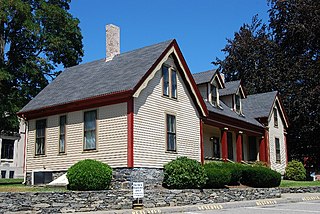
The Morse House is a historic house located at 6 Pleasant Street in Taunton, Massachusetts.

The William Lawrence House is a historic house at 101 Somerset Avenue in Taunton, Massachusetts. It was built in 1860 by local carpenter Abel Burt for William Lawrence, a salesman. It is a two-story roughly square wood-frame structure, with a mansard roof topped by a cupola. The main entrance is set in a round-arch opening with a transom window, and its front porch features chamfered posts. The house contains a unique mix of Italianate elements, such as its square plan, large cupola and bracketed eaves, combined with Second Empire elements such as its unusual Mansard roof with ogee curve sides and pronounced dormers.

The Job Knapp House is a historic house located at 81 Shores Street in Taunton, Massachusetts.

The Higgins-Hodgeman House is a historic house located at 19 Cedar Street in Taunton, Massachusetts.
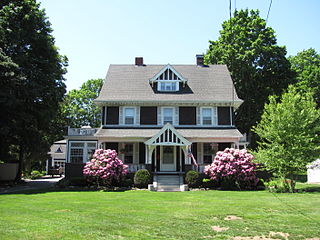
The House at 199 Summer Avenue in Reading, Massachusetts is designated as historic. The original two-and-a-half-story house was designed by architect Horace G. Wadlin and built in 1878 for Robert Kemp, leader of the popular Old Folks Concerts. The house was the second in Reading that Kemp had built; the first also is still standing.

The Joseph Temple House is a historic house in Reading, Massachusetts. The Second Empire wood-frame house was built in 1872 by Joseph Temple, owner of locally prominent necktie manufacturer. The house was listed on the National Register of Historic Places in 1984.

The George Cowdrey House is a historic house at 42 High Street in Stoneham, Massachusetts. It was built about 1865 for George Cowdrey, a local shoe manufacturer and state legislator, and is one of the town's finest examples of residential Second Empire architecture. It was listed on the National Register of Historic Places in 1984.
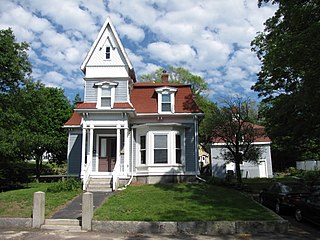
The E. A. Durgin House is a historic house at 113 Summer Street in Stoneham, Massachusetts. The two-story wood-frame Second Empire style house was built c. 1870 for E. A. Durgin, a local shoe dealer, and is one of Stoneham's most elaborately styled 19th century houses. Its main feature is a square tower with a steeply pitched gable roof that stands over the entrance. The gable of the tower is clad in scalloped wood shingles, and includes a small window that is topped by its own gable. The house has a typical mansard roof, although the original slate has been replaced with asphalt shingling, with a cornice that is decorated with dentil molding and studded by paired brackets.

The Lorenzo D. Hawkins House is a historic house at 1 Cedar Street in Stoneham, Massachusetts. The property consists of a house and carriage house, both built c. 1870, that are among Stoneham's finest Second Empire buildings. The house is a two-story wood-frame structure with irregular massing. It has the classic mansard roof, an ornately decorated entry porch, heavily bracketed cornice, and round-arch windows in its dormers and front bay. The carriage house features a polychrome mansard roof.
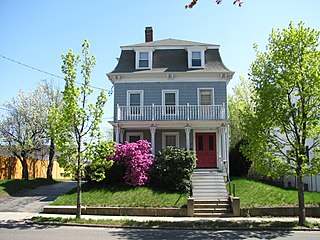
The House at 12 West Water Street in Wakefield, Massachusetts is a rare local example of a Second Empire house. The wood-frame house was built around 1860, and has two full stories, and a third beneath the mansard roof. It is three bays wide, with a wide double-door entry, and a porch across the front with elaborately decorated posts. The house may have been built by Cyrus Wakefield, owner of the Wakefield Rattan Company, and sold to a company employee. A later owner was George Cox, who owned a billiard parlor in the town center.

The Moses-Kent House is a historic house at 1 Pine Street in Exeter, New Hampshire. Built in 1868 for a prominent local merchant, it is one of the town's finest examples of Victorian residential architecture. It was added to the National Register of Historic Places on September 12, 1985.
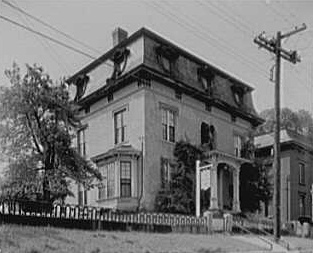
The Franklin Pierce House was a historic house at 52 South Main Street in Concord, New Hampshire, United States. Built in 1852, it was a significant local example of Second Empire architecture, and was one of two surviving Concord homes of President Franklin Pierce at the time of its listing on the National Register of Historic Places in 1979. Pierce died in the house in 1869. It was destroyed by fire on September 17, 1981.























